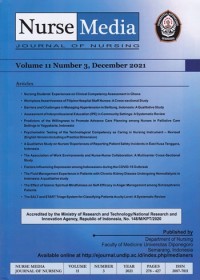
Jurnal
The Effect of Islamic Spiritual Mindfulness on Self-Efficacy in Anger Management among Schizophrenic Patients
Background: The prevalence of schizophrenia has increased in the last few years. Nevertheless, methods in assisting schizophrenic patients have not improved significantly. Islamic spiritual mindfulness is a spiritual approach that can help schizophrenic patients increase their self-efficacy in anger management. However, the application of this intervention is still not well researched.
Purpose: This study aimed to determine the effect of Islamic spiritual mindfulness on self-efficacy in anger management among schizophrenic patients.
Methods: This study utilized a pre-post quasi-experimental design with a control group. A total of 54 schizophrenic patients were purposively recruited and divided into two groups: the intervention group (n=27) and the control group (n=27). The intervention group received four sessions of Islamic spiritual mindfulness in two weeks, while the control group received a standard intervention from the hospital. The data were collected using the Regulatory Emotional Self-Efficacy (RESE) scale and analyzed using the t-test.
Results: The results showed a significant difference in self-efficacy scores between the control and intervention groups (p=0.000) after the intervention. In the pre-test, the mean score of self-efficacy in the intervention group was lower than the control group (M=28.15 vs. M=30.26) without a significant difference. However, in the post-test, a significant difference in self-efficacy between the intervention and control groups was found (M=46.44 vs. M=46.44; p=0.000).
Conclusion: Islamic spiritual mindfulness significantly affects self-efficacy among schizophrenic patients. The Islamic spiritual mindfulness can be applied as a new form of approach to increase self-efficacy in schizophrenic patients.
Availability
No copy data
Detail Information
- Series Title
-
Nurse Media Journal of Nursing, Vol. 11 No. 3 December 2021
- Call Number
-
(05) 610.5 DEP n
- Publisher
- Semarang : Department of Nursing, Faculty of Medicine Diponegoro University., 2021
- Collation
-
Hlm. 404-412
- Language
-
English
- ISBN/ISSN
-
2087-7811
- Classification
-
(05) 610.5 DEP n
- Content Type
-
-
- Media Type
-
-
- Carrier Type
-
-
- Edition
-
Vol. 11 No. 3 December 2021
- Subject(s)
- Specific Detail Info
-
-
- Statement of Responsibility
-
-
Other version/related
No other version available
File Attachment
Comments
You must be logged in to post a comment
 Computer Science, Information & General Works
Computer Science, Information & General Works  Philosophy & Psychology
Philosophy & Psychology  Religion
Religion  Social Sciences
Social Sciences  Language
Language  Pure Science
Pure Science  Applied Sciences
Applied Sciences  Art & Recreation
Art & Recreation  Literature
Literature  History & Geography
History & Geography